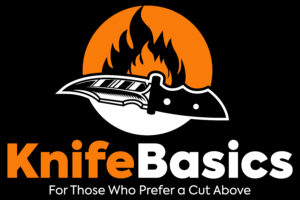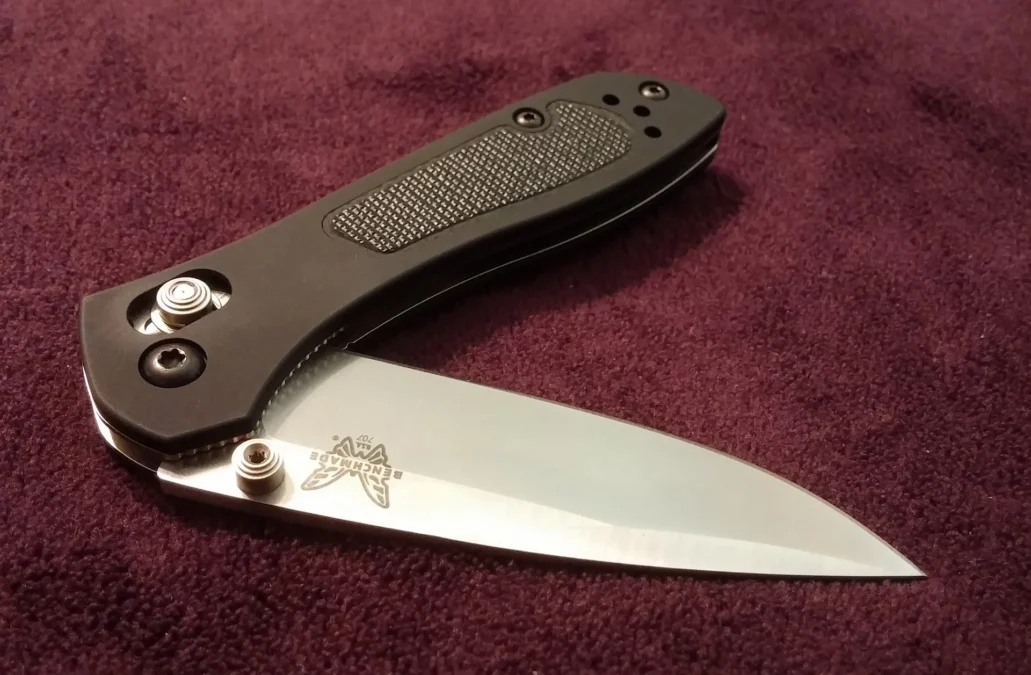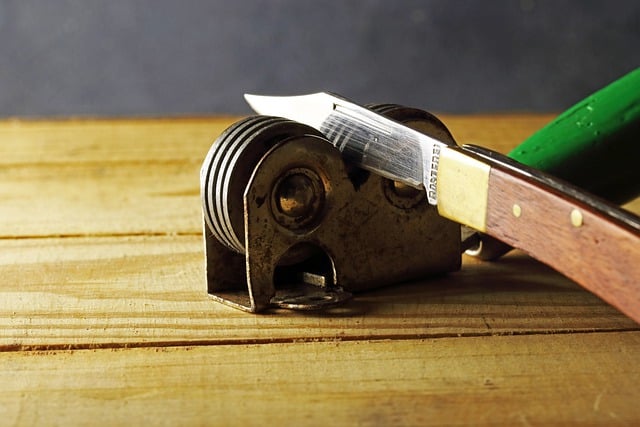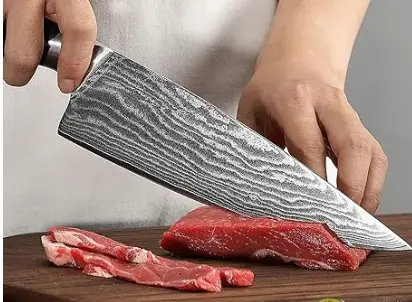What is 154CM Steel?
154CM stainless steel is among the oldest steel on the market, and it was initially designed to manufacture jet engine turbine components meaning that it holds high levels of toughness.
Suppose you wonder how they came up with the name. The letter “CM” in its name stands for Climax Molybdenum, the company that first manufactured this steel before selling it to current manufacturers of Crucible industries. The number “154 “does not have a specific meaning.
154CM Steel Composition
- Carbon C 1.05%: Increases edge retention, hardness, and tensile strength. It also improves steel resistance to wear, abrasion, and corrosion.
- Chromium Cr 14.00%: Chromium Increases the hardness, tensile strength, and corrosion resistance of a blade.
- Manganese Mn 0.50%: improves the strength and hardness of steel. When the steel is heat treated, hardenability is improved with increased manganese.
- Vanadium V 0.40%: Inhibits grain growth during elevated temperature processing and heat treatment, which enhances the strength and toughness of steel. It also forms carbides that increase wear resistance.
- Molybdenum Mo 4.00%: increases toughness and hot hardness. It also improves hardenability and forms carbides for wear resistance.
- Silicon Si 0.80%: Increases strength and heat resistance.
- Phosphorus P 0.03%: Improves machinability and hardness.
- Sulfur S 0.03%: Improves machinability.
- Tungsten W 0.40%: used as an alloying ingredient due to its high melting point, hence improving the performance of steel in high heat.
Properties of 154CM steel
Hardness
154CM is reasonably hard steel, it has a Rockwell hardness rated at 60-61 HRC. It gets its hardness from the blend of carbon, vanadium, and chromium in its composition. It is not the hardest steel out there but it’s harder than most knife-making steels.
Toughness
154CM steel offers decent toughness and is even better when double-tempered. We expect all hard steels to have reduced toughness, but this is not the case with double-tempered 154CM stainless steel.
With this feature, it has a good balance of hardness and toughness. Considering that this steel was initially made for very tough applications, knives made from this steel cannot break or chip even in challenging applications.
The toughness of 154CM blade steel is mostly equivalent to the toughness of other blade steels like M390 steel, N690 Steel, and Carpenter CTS BD1N steel.
Edge Retention
As with other hard steels, 154CM has excellent edge retention. You can use knives made from this steel for days without the need for sharpening. The high edge retention in this steel is associated with the solid elements in its composition.
The edge retention of 154CM knife steel is similar to VG 10 stainless steel and ATS 34 stainless steel. This property is attributed to the high carbon amounts in its composition.
Corrosion resistance
Since 154CM is stainless steel, this steel can resist corrosion and rust. However, this does not mean that it is entirely rust-resistant. It will still rust if used in a corrosive environment if left unattended. With that in mind, ensure to clean and wipe 154CM steel knives dry after use.
154CM stainless steel corrosion resistance is at par with other knife steels like AEB-L stainless steel, 8Cr13MoV stainless steel and the PM version of 154CM, that is CPM 154 Steel.
Sharpening 154CM Steel
It is not common to find hard steels which are easy to sharpen, but 154CM is that steel. You can achieve a razor blade edge on 154CM knife steel with minimum effort using simple sharpening tools.
If you are a beginner at knife sharpening, 154CM steel can help you perfect your sharpening skills. However, as with other steels, do not leave it to become extra dull before re-sharpening because it will make it harder to get an edge.
Wear resistance
Considering its composition and hardness, 154CM knife steel does not experience wear and tear easily. The high amounts of carbon and chromium, in addition to manganese and vanadium, contribute to excellent wear resistance.
154CM Steel Equivalent
ATS 34 steel is a 154CM steel equivalent, ATS 34 steel is developed in Japan by Hitachi Industry. It was developed after Crucible could no longer produce enough steel for the cutlery industry a few decades ago.
Bob Loveless reached out to Hitachi Industry to develop steel similar to 154CM steel and thus the birth of ATS 34 Steel. ATS 34 knife steel shares a similar performance with 154CM knife steel in terms of corrosion resistance, toughness and edge retention.
154CM steel vs D2 Steel
154CM steel is stainless steel, while D2 does not qualify as stainless steel due to low chromium content. 154CM steel is stainless steel with 13.5% to 14% chromium content compared to D2 steel’s 11% to 12%. 154CM steel knives thus offer better corrosion resistance than D2 steel knives.
D2 steel has higher carbon content at 1.5% to 1.6% compared to Crucible 154CM steel’s 1.05%. This extra carbon gives D2 Steel higher Rockwell hardness and better wear resistance while enhancing its edge retention properties.
These two blade steels offer almost similar functionality, but they are different in that D2 steel offers better edge retention while 154CM shines in corrosion resistance and it is easier to sharpen.
154CM Steel vs 1095 Steel
154CM is stainless steel with over 13% chromium content while 1095 is a low alloy non-stainless steel with no chromium elements in its alloy composition. 154CM knife steel thus offers better corrosion resistance compared to 1095 knife steel.
1095 steel with a Rockwell hardness of 55HRC offers better toughness than 154CM knife steel. 1095 blades are able to withstand high-impact applications without chipping or breaking. 1095 steel is also easy steel to forge for beginning bladesmiths.
154CM steel offers better edge retention than 1095 steel due to the improved alloy composition that contains a greater number of alloying elements. The addition of other elements like Vanadium enables the formation of carbides which are excellent for edge retention.
440C vs 154CM
440C steel is stainless steel with 17% to 18% chromium content. It has higher chromium content at 17% compared to the 154CM steel’s 14%. This additional chromium element gives it better corrosion resistance and enhances its Rockwell hardness too.
154CM steel is a modification of 440C stainless steel with carbon, Molybdenum, and chromium as its primary elements. 154CM steel performance is hugely similar to 440C in terms of edge retention and toughness.
154CM stainless steel offers higher Rockwell hardness at 61HRC than 440C stainless steel at 60HRC, the higher hardness may slightly improve its wear resistance over 440C but may make it harder to sharpen when the need arises.
154CM vs N690 Steel
N690 steel and 154CM steel alloy compositions are hugely similar, with the notable difference being that N690 steel has slightly more molybdenum and additional cobalt elements, which are not present in 154CM steel.
N690 stainless steel offers better corrosion resistance than 154CM stainless steel due to the additional Chromium and Cobalt elements. The effect of cobalt in N690 steel on corrosion resistance might be minimal and not the main reason for the increased corrosion resistance.
154CM and N690 are both budget steel with balanced performance in terms of edge retention and toughness. They offer similar levels of edge retention and toughness and the significant difference between these two blade steel occurs only in corrosion resistance.
Is 154CM steel good for knives?
You can also check the better-performing powder versions of 154CM steel that tend to offer slightly better toughness; these are CPM 154 stainless steel and RWL34 stainless steel.



